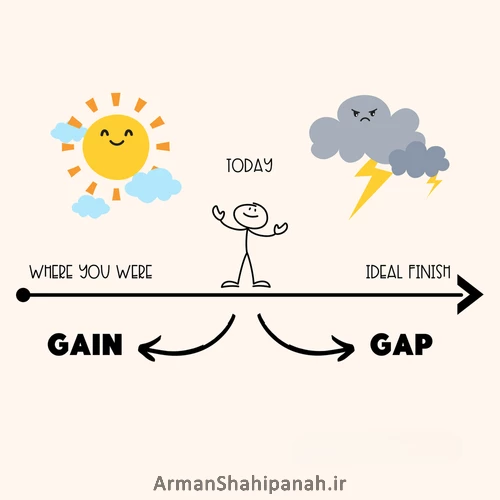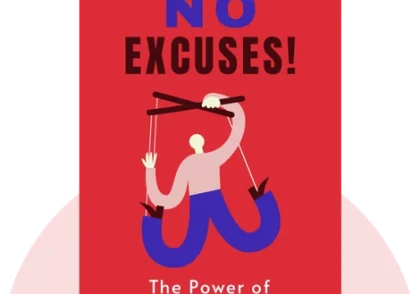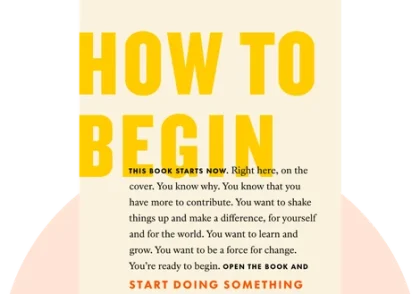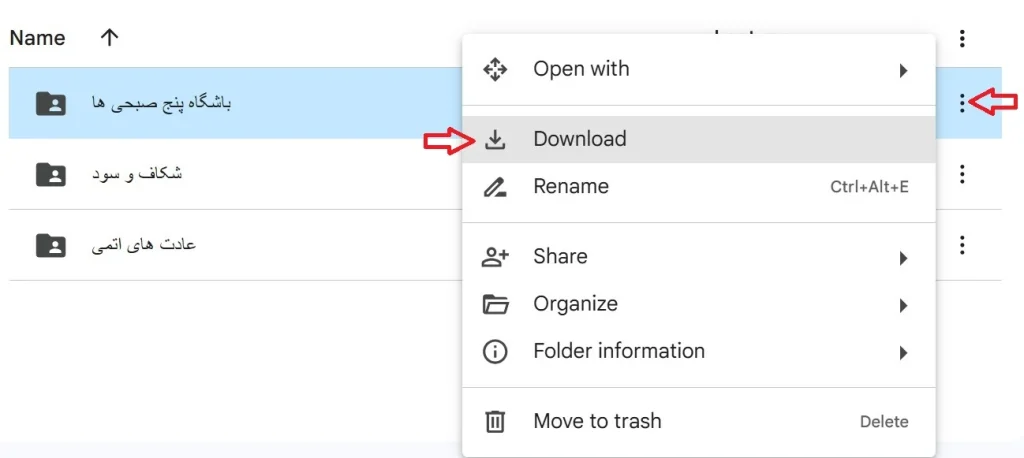- زمان مطالعه و تمرین: 20 + 15 دقیقه
- سطح انگلیسی: متوسط
اگه سطح زبانت مبتدیه:
اول نکات کلیدی بخش فارسی رو بخون. بعد از خوندن هر نکته، معادلش رو از توی بخش نسخه انگلیسی بررسی کن. اینجا میتونی همزمان صوت کتاب رو هم گوش بدی تا اینطوری ذهنت رابطه بین کلمات و مفهومشون رو سریعتر متوجه بشه
اگه سطح زبانت متوسطه:
بدون نگاه کردن به متون بخش فارسی یا انگلیسی، هر نکته کلیدی رو اول از طریق صوت کتاب گوش بده و بعد متن انگلیسی متناظرش رو بخون. در نهایت هم تمرین های بخش درک مطلب رو انجام بده و لغات مهم و اصطلاحات رو تمرین کن
اگه سطح زبانت قویه:
و میخوای خودتو به چالش بکشی فقط صوت کتاب رو گوش بده و مستقیم تست های بخش درک مطلب رو انجام بده

7 نکته کلیدی کتاب
نکته کلیدی 1 از 7
مسئولیت شادی خودت رو به عهده بگیر.
دن جنسن یکی از بهترین اسکیتبازهای سرعت تو دنیاست. تو سال ۱۹۸۴، وقتی فقط ۱۶ سال داشت، تو المپیک زمستونی شرکت کرد و نزدیک بود یه مدال بگیره. نزدیک – ولی نه کامل.
برای ده سال طولانی بعد از اون، بدشانسی دنبالش بود. با اینکه خیلی توانا بود، ولی مدال طلا تو المپیک از دستش در میرفت. تو سال ۱۹۹۴، جنسن فکر کرد یه بار دیگه تو لیلهامر نروژ امتحان کنه – ولی تو مسابقاتی که معمولاً توشون بهترین بود، بد عمل کرد.
زودی فقط یه مسابقه دیگه مونده بود، مسابقه ۱۰۰۰ متر. جنسن میدونست که احتمال بردنش خیلی کمه.
ولی به جای اینکه برای یه شکست دیگه ناراحت بشه، یه دیدگاه دیگه به این مسابقه آورد. وقتی تو خط شروع قرار گرفت، به همه چیزایی که تو دوران حرفهایش به دست آورده بود فکر کرد؛ مربیهایی که سخاوتمندانه بهش کمک کرده بودن، جاهایی که دیده بود، و لذتی که از اسکیت کردن برده بود.
پیام اصلی اینه: مسئولیت شادی خودت رو به عهده بگیر.
جنسن تصمیم گرفت که آخرین مسابقهاش رو وقف قدردانی از دنیای اسکیت سرعت کنه. این قرار بود خداحافظیش با یه دوران طولانی و پربار باشه.
پس با یه لبخند بزرگ رو صورتش مسابقه داد. و این شد بهترین مسابقه دوران حرفهایش. جنسن مسابقه رو برد و تو همین حین یه رکورد جهانی هم شکست. فکرای مثبتش نتیجه مثبت آورد.
خیلی از افراد موفق نمیتونن اینطوری فکر کنن. اونا فکر میکنن که باید خودشون رو ناراحت کنن تا انگیزه بگیرن. طرز فکرشون اینطوریه: اگه خیلی از زندگیت راضی باشی، دیگه دلیلی برای موفقیت نداری. ولی این اصلاً درست نیست.
در واقع، مطالعات زیادی نشون دادن وقتی تو یه حالت ذهنی مثبت هستی، عملکردت بهتره. اعتماد به نفس بیشتری داری، خلاقانهتر فکر میکنی، و تو تغییر شرایط بهتر سازگار میشی.
ولی وقتی استرس داری و منفیبافی، وارد حالت بقا میشی. این باعث میشه هر نوع تفکر خلاقانهای رو از بین ببری. همچنین، دیگه از کارت لذت نمیبری – و انگیزه درونیت کم میشه.
جنسن اینقدر موفق بود چون دیگه برای شاد یا پر بودن نیازی به برد نداشت. البته که میخواست ببره. ولی شادی براش درونی شده بود.
اگه دنبال شادی بیرون از خودت بگردی، داری همه قدرتت رو میدی بیرون. زندگی میشه یه دوی بیپایان برای رسیدن به چیزایی که فکر میکنی نیاز داری. ولی تو به هیچ چیز یا هیچ کس دیگهای برای شاد بودن نیاز نداری. همین حالا میتونی شادی رو انتخاب کنی، با یاد گرفتن اینکه زندگیت رو همونطوری که هست، قدر بدونی.
نکته کلیدی 2 از 7
خودتو با دیگران مقایسه نکن.
تا حالا شده اینستاگرام رو بالا و پایین کنی و حسابی حسودی کنی به تعطیلات دوستت تو تایلند یا عروسی شیک پسرعموت؟
اگه اینطوری رفتار کردی، دقیقا همون کاری رو میکنی که سازندگان پلتفرمهایی مثل فیسبوک و اینستاگرام میخوان. شبکههای اجتماعی طراحی شدن تا تو رو وادار کنن که خودتو مدام با بقیه مقایسه کنی. هدفشون اینه که تو رو دچار FOMO کنن – ترس از اینکه همه اون چیزایی که فکر میکنی بقیه دارن رو از دست بدی.
در واقع، این پلتفرمها طوری ساخته شدن که حس کنی زندگیت به اندازه کافی خوب نیست. کارشون اینه که تو رو تو یه شکاف نگه دارن – که حس کنی زندگیت به ایدهآلها نمیرسه.
چرا شبکههای اجتماعی این کار رو میکنن؟ خب، چون اگه حس کنی چیزی رو از دست دادی، احتمالاً شروع میکنی به خرید کردن تا اون شکاف رو پر کنی. به عبارت دیگه، شبکههای اجتماعی وضعیت ذهنی تو رو دستکاری میکنن تا تو رو به یه مصرفکننده ارزشمندتر تبدیل کنن.
پیام اصلی اینه: خودتو با دیگران مقایسه نکن.
واقعیت اینه که مقایسه خودت با بقیه بیفایدهست. این باعث میشه که دنبال نمادهای بیرونی موفقیت باشی، مثل یه خونه بزرگ یا یه ماشین لوکس. ولی هیچ خریدی، هرچقدر هم گرون باشه، نمیتونه واقعاً تو رو راضی کنه.
تنها چیزی که میتونه تو رو خوشحال و راضی کنه اینه که به استاندارد موفقیت درونی خودت برسی.
ولی این استاندارد چیه؟ اگه بلافاصله جواب نداری، تنها نیستی. یه حدس با دانش: وقتی مدرسه بودی، احتمالاً پدر و مادر یا معلمها هیچ وقت ازت نپرسیدن چی برات مهمه. هیچکس نخواست بدونه که تو، شخصاً، چطور موفقیت رو میسنجی.
تمرکز احتمالاً جای دیگهای بود – شاید آزمونهای استاندارد شده یا بردن اون مسابقه فوتبال.
به عنوان یه بزرگسال، فرصت خاصی داری که خودت تصمیم بگیری. تو میتونی خودت تعیین کنی که واقعاً چی اهمیت داره.
یه زمانی برای فکر کردن به این موضوع بذار، بعد یه لیست از ده چیزی که وقتی موفق هستی حاضره، بنویس. یادت باشه که لیست تو با لیست بقیه یکی نخواهد بود. و این دقیقاً همون نکتهست.
آیا نسخه تو از موفقیت به این شکله که وقت کافی برای خانوادت داشته باشی؟ یا اینه که هر وقت دلت خواست سفر کنی؟ مطمئن شو که لیستت تا حد ممکن دقیق باشه.
دفعه بعد که یه شغل جدید یا فرصت دیگهای پیش اومد، از خودت بپرس: آیا این با چیزایی که تو لیستم هست میخونه؟ اگه جواب نه بود، پس اون فرصت برای تو نیست، هرچقدر هم معتبر به نظر برسه.
نکته کلیدی 3 از 7
چطوری که به زندگیت نگاه میکنی، شکل زندگیت رو تعیین میکنه.
یه چیزی هست که شاید ندونی. ذهنیتت میتونه روی سلامت جسمی و حتی طول عمرت تأثیر بذاره.
یه مطالعه این موضوع رو با بررسی یه گروه غیرمعمول ثابت کرد: راهبهها. دانشمندان نامههای پذیرشی رو که ۱۸۰ زن جوان به صومعههای آیندهشون نوشته بودن، بررسی کردن.
و حدس بزن چی شد: یه رابطه مستقیم بین لحن این نامهها و طول عمر راهبهها وجود داشت. اونایی که خودشون رو مثبت توصیف کرده بودن، به طور متوسط ده سال بیشتر از راهبههایی که نامههاشون منفی بود، عمر کردن.
نود درصد از این گروه مثبت حداقل تا ۸۵ سالگی زنده موندن، در حالی که فقط یکسوم از راهبههای گروه دیگه اینقدر عمر کردن.
طرز توصیف زندگی آدمها در دهه بیست زندگیشون تأثیر زیادی روی بقیه زندگیشون داشت.
پیام اصلی اینه: چطوری که به زندگیت نگاه میکنی، شکل زندگیت رو تعیین میکنه.
رابطه بین ذهن و بدن به خوبی مستند شده. آدمهای ناراضی کمتر در برابر ویروسها مقاومت دارن و بیشتر از کار مرخصی میگیرن. اونایی که ذهنیت مثبتی دارن، از طرف دیگه، میتونن بدون تغییر رفتار، سلامت خودشون رو بهبود بدن.
مثلاً، یه مطالعه با یه گروه از ۸۴ زن که اتاقهای هتل رو تمیز میکردن، کار کرد. به نیمی از گروه گفته شد که فعالیتهای تمیز کردنشون ورزش خوبی هست که میتونه سلامتیشون رو بهبود بده. به نیمه دیگه – گروه کنترل – هیچ چیزی گفته نشد.
بعد از چهار هفته، گروهی که پیام مثبت رو دریافت کرده بودن، وزن کم کردن و فشار خونشون پایین اومد. بقیه هیچ بهبودی ندیدن.
وقتی که زندگیت رو به طور منفی میبینی، داری توی یه شکاف (GAP) زندگی میکنی. خودت رو انتقاد میکنی؛ حس میکنی که زندگیت به اندازه کافی خوب نیست. این روی بدنت تأثیر میذاره. باعث میشه که به طور مزمن استرس داشته باشی، عصبی و مضطرب باشی.
در طول سالها، اثرات این طرز فکر شکاف (GAP) بدنت رو فرسوده و ضعیف میکنه.
ولی یه راه جایگزین برای زندگی توی شکاف وجود داره، و اون زندگی توی پیشرفت (GAIN) هست. این یعنی به خودت بابت پیشرفتی که داشتی اعتبار بدی و هر تجربهای رو ارزشمند ببینی. اگه به زندگیت با این دید مثبت نگاه کنی، خوشحالتر و سالمتر میشی.
اما چطور واقعاً میتونی توی این حالت پیشرفت (GAIN) زندگی کنی؟ خب، این کار نیاز به تمرین داره.
برای شروع، از آدمهای معتمد دور و برت بخواه که به عنوان دوستای مسئولیتپذیر همراهت باشن. کار اونا اینه که وقتی دوباره به فکر شکاف (GAP) برگشتی بهت خبر بدن.
و یه چیز دیگه که باید انجام بدی اینه که ذهنیت پیشرفت (GAIN) رو تمرین کنی. میتونی این کار رو مثلاً با لیست کردن دستاوردهات تا حالا، یا با فکر کردن به همه چیزایی که از یه موقعیت ناخوشایند یاد میگیری، انجام بدی.
با گذشت زمان، دیدگاه پیشرفت (GAIN) به همون اندازه عادت میشه که شکاف (GAP) یه زمانی بود.
نکته کلیدی 4 از 7
پیشرفتت رو دنبال کن و موفقیتهات رو جشن بگیر.
رازی یه بچهایه که به یه اختلال شدید مغزی به اسم لیسنسفالی مبتلاست. دکترها به والدینش گفتن که هیچ وقت مهارت جدیدی یاد نمیگیره.
ولی به لطف ساعتها کار با فیزیوتراپیست فداکارش، رازی خلاف این رو ثابت کرده. توی فقط یک سال، یاد گرفت که روی چمن و سطوح ناهموار دیگه راه بره. در واقع، اونقدر اعتماد به نفس پیدا کرده که همه کاملاً فراموش کردن که اصلاً قبلاً این براش مشکل بوده.
این تغییر دلیل اینه که فیزیوتراپیستش یادداشتهای دقیقی نگه میداره و تماسهای منظم برای بررسی پیشرفت با والدین رازی برنامهریزی میکنه. جشن گرفتن آگاهانه پیشرفتهاش باعث میشه که همه انگیزه بیشتری برای ادامه داشته باشن.
پیام اصلی اینه: پیشرفتت رو دنبال کن و موفقیتهات رو جشن بگیر.
خیلی راحت میتونی موفقیتهای فوقالعادهات رو فراموش کنی، چون به زودی برات عادی میشن. در واقع، مغز انسان طوری ساخته شده که فراموش کنه. وقتی که یه مهارت جدید رو یاد میگیری، مغزت بهت اجازه میده که اون رو ناخودآگاه و توی حالت اتوماتیک استفاده کنی. خیلی وقتها حتی متوجه نمیشی که داری یه کار جدید انجام میدی.
برای همین، خیلی مهمه که یادداشتهای دقیقی از پیشرفتت نگه داری. یادداشتنویسی بهت این امکان رو میده که چالشهایی که باهاشون مواجه شدی و راهحلهات رو ثبت کنی. خوندن یادداشتها باعث میشه که از پیشرفتهایی که کردی، قدردانی کنی.
خیلیها اشتباه میکنن که پیشرفت خودشون رو با یه ایدهآل در آیندهای که تو ذهنشون دارن میسنجن. ولی این راهی برای ناامیدیست. آینده هنوز اتفاق نیفتاده، پس واقعی نیست. ولی گذشته هست. سنجیدن نتایج خاصت نسبت به گذشته بهت اجازه میده که واقعاً بفهمی چقدر جلو اومدی.
یه لحظه فکر کن که ده سال پیش تو زندگیت کجا بودی. چطور وقتت رو میگذروندی؟ فکر میکردی چی مهمه؟ تو این سالها چه اتفاقهایی افتاده؟
یه لیست دقیق و مشخص از همه چیزهایی که تو این مدت به دست آوردی بنویس. مطمئن شو که فقط پیشرفت در ثروت مادی یا جایگاه اجتماعی رو شامل نمیکنی – به این هم فکر کن که ذهنیتت چطور رشد کرده. آیا اتفاقهای سخت یا استرسزایی بودن که درسهای ارزشمندی بهت یاد دادن؟ اون درسها چی بودن؟
حالا این تمرین رو تکرار کن، و پیشرفتهایی که تو سه سال گذشته و حتی ۹۰ روز گذشته داشتی رو بررسی کن. انجام آگاهانه این تمرین باعث میشه با اعتماد به نفس و انگیزه بیشتری جلو بری.
این کار همچنین بهت حس واضحتری از اینکه کجا میخوای بری میده.
نکته کلیدی 5 از 7
آخرین ساعت روزت رو به جشن گرفتن موفقیتها و برنامهریزی برای دستاوردهای آینده اختصاص بده.
شاید ندونی، ولی ساعتی که قبل از خواب میگذرونی یکی از مهمترین ساعات کل روزت هست. اینکه چطور این زمان رو میگذرونی روی خوابت تأثیر میذاره و بهرهوریت رو در ۲۴ ساعت بعدی تحت تأثیر قرار میده. اما بیشتر مردم این ۶۰ دقیقه رو به بیهوده گشتن توی گوشیهاشون هدر میدن.
ثابت شده که گوشیهای هوشمند شبها مغز رو بیش از حد تحریک میکنن و باعث میشن خوابیدن سختتر بشه. پس اگه قبل از خواب از گوشی استفاده کنی، به احتمال زیاد خوابآلود و مضطرب بیدار میشی.
ولی همه چیز هم بد نیست. با چند تغییر ساده، میتونی این ساعت قبل از خواب رو به یه فرصت قدرتمند تبدیل کنی تا خوابت رو بهبود بدی و روزهات رو بهتر برنامهریزی کنی.
پیام اصلی اینه: آخرین ساعت روزت رو به جشن گرفتن موفقیتها و برنامهریزی برای دستاوردهای آینده اختصاص بده.
همه چیز از اینجا شروع میشه که حداقل نیم ساعت قبل از خواب گوشیت رو کنار بذاری. به جاش، یه خودکار و کاغذ بردار و درباره روزی که گذروندی فکر کن.
به طور مشخص، به سه تا موفقیتی که امروز داشتی فکر کن و اونها رو بنویس. یادت باشه، اینها موفقیتهای شخصی تو هستن، نه کس دیگه. اگه شستن لباسها برات یه چالش بوده، پس شستن یه سری لباس قطعا یه موفقیت حساب میشه.
وقتی موفقیتهات رو نوشتی، به سه موفقیتی که فردا میخوای به دست بیاری فکر کن.
این تمرین ساده روزهات – و شبهات – رو تغییر میده. ثبت موفقیتهای امروزت تو رو توی ذهنیت پیشرفت (GAIN) قرار میده و اعتماد به نفس و احساس خوشبختیت رو افزایش میده. این باعث خواب آرامتری میشه.
مشخص کردن واضح اهداف فردا به مغزت اجازه میده که اونها رو به صورت ناخودآگاه پردازش کنه، پس با حس هدفمندی از خواب بیدار میشی. به جای اینکه فقط به هر چیزی که سر راهت قرار میگیره واکنش نشون بدی، یه برنامه واضح و قابل اجرا خواهی داشت.
این تمرین همچنین ذهنت رو تمرین میده که در طول روز دنبال پیشرفت باشه. همه ما توجه انتخابی داریم – این باعث میشه بیشتر محرکهای دنیا رو فیلتر کنیم و فقط روی چیزهای مهم، جالب یا مرتبط تمرکز کنیم.
خب، چرا از این ویژگی به نفع خودت استفاده نکنی. اگه یاد بگیری روی سه تا موفقیت تمرکز کنی، مغزت به طور خودکار شروع میکنه به دنبال کردن بیشتر و بیشتر دستاوردها. این اعتماد به نفست رو تقویت میکنه و انرژی بیشتری بهت میده تا به دنبال آرزوهات بری. به این کار ادامه بده و به زودی بلند شدن از رختخواب دیگه برات یه چالش نخواهد بود. در عوض، مشتاق شروع روزت خواهی بود و آماده برای دستاوردهای بزرگ.
نکته کلیدی 6 از 7
تو میتونی هر تجربهای که به نظر منفی میاد رو با تغییر دیدگاهت به یک پیشرفت تبدیل کنی.
۲۹ سپتامبر ۲۰۰۸، روزی بود که زندگی هاوارد گتسون رو تغییر داد. یک شبه، ۲ میلیون دلار رو در بازار سهام از دست داد. گتسون به شدت تکان خورد. به نظر میرسید که معاملاتش کاملاً از کنترل خارج شده بود.
اما بعد بیشتر فکر کرد. اون روز یه ضرر وحشتناک داشت، بله. اما نه همه. برعکس، بعضی از معاملهگران همون شب ثروتهای عظیمی به دست آوردن.
چرا استراتژیهای اونها جواب داده بود و مال او نه؟ چی میتونست از اونها یاد بگیره؟
گتسون کل شب به این موضوع فکر کرد و تا صبح، دیدگاهش رو کاملاً تغییر داد. به جای اینکه از دست دادن ۲ میلیون دلار اون رو ناامید کنه، حالا این تجربه رو به عنوان یه فرصت برای تحول میدید.
مهندسهای گتسون شروع به توسعه نرمافزارهای جدید و نوآورانهای کردن که از هوش مصنوعی برای تطبیق با شرایط متغیر بازار استفاده میکرد. از دست دادن ۲ میلیون دلار میتونست تا آخر عمرش تو ذهنش بمونه، اما اون اجازه نداد این اتفاق بیفته.
پیام اصلی اینه: تو میتونی هر تجربهای که به نظر منفی میاد رو با تغییر دیدگاهت به یک پیشرفت تبدیل کنی.
گتسون یک ویژگی به نام انعطافپذیری روانی رو از خودش نشون داد. این توانایی مدیریت احساسات و شکل دادن به معنای تجربیاتت به صورت پیشفعالانه است.
انعطافپذیری روانی همون چیزی هست که بهت اجازه میده بعد از یک شکست دوباره بلند بشی. به جای اینکه وقتی اوضاع طبق برنامه پیش نمیره گیر بیفتی، اونچه که اتفاق افتاده رو میپذیری و راههای جدید و خلاقانهای برای رسیدن به هدفت پیدا میکنی.
همه با انعطافپذیری روانی به دنیا نمیان، اما همه قابلیت توسعهش رو دارن. این سفر با قبول مسئولیت برای هر چیزی که برات اتفاق میافته – خوب یا بد – شروع میشه. تو نمیتونی تمام دنیا رو کنترل کنی، ولی میتونی انتخاب کنی که چطور بهش واکنش نشون بدی.
یکی از نویسندگان، دن سالیوان، یک تمرین قدرتمند توی کارگاههای خودش ایجاد کرده به نام “تبدیل تجربهها”. این یک آزمایش فکریه که بهت اجازه میده آنچه برات اتفاق افتاده رو بازتعریف کنی.
اینطوریه که انجام میشه: یه قلم و کاغذ بردار و به این سوالات جواب بده: از این تجربه چی یاد گرفتی که میتونه در آینده بهت کمک کنه؟ دفعه بعد چی میخوای متفاوت انجام بدی؟ و به خاطر چی قدردانی میکنی؟
این تمرین بهت فضای پردازش تجربه رو میده به جای اینکه ازش فرار کنی. و قدرت میده که روایت خودت رو از آنچه برات اتفاق افتاده خلق کنی. با این دید، هر تجربهای میتونه یک پیشرفت باشه.
—
نکته کلیدی 7 از 7
خلاصه نهایی
پیام اصلی این نکات:
هیچکس نیازی به دنبال کردن خوشبختی نداره. تو میتونی همین حالا خوشحال باشی. به جای مقایسه خودت با دیگران، معیارهای موفقیت درونی خودت رو تعریف کن. تو نمیتونی پیشرفتت رو با یک ایدهآل آینده اندازه بگیری، چون آینده همیشه خیالیه. در عوض، پیشرفتت رو با گذشته خودت مقایسه کن و دستاوردهای بزرگت رو جشن بگیر. این همون تفکر پیشرفت (GAIN) هست که پر از انرژی و انگیزهت میکنه. شاید به صورت طبیعی نیاد، اما میتونی با انجام تمرینات ساده این تفکر رو تمرین کنی.
نکته قابل اجرا:
پنج دقیقه به خودت اجازه بده توی شکاف (GAP) باشی.
طبیعیه که وقتی زندگی مطابق میلت پیش نمیره، غمگین یا ناامید بشی. انتظار نداشته باش که به خاطر کشف قدرت تفکر مثبت، ناگهان همیشه خوشحال بشی. به جاش، پنج دقیقه به خودت فرصت بده که واقعاً ناراحت باشی، غر بزنی، و بعد از یک ناامیدی خودت رو سرزنش کنی. به عبارت دیگه، از اون پنج دقیقه استفاده کن تا کاملاً توی شکاف (GAP) باشی. اما بعدش، به این فکر کن که چطور از این تجربه بهره بردی و چقدر پیشرفت کردی – و آگاهانه به تفکر پیشرفت (GAIN) تغییر دیدگاه بده.
نسخه انگلیسی
Key idea 1 of 7
Take ownership of your own happiness.
Dan Jansen is one of the best speed skaters in the world. In 1984, when he was just 16, he took part in the Winter Olympics and nearly won a medal. Nearly – but not quite.
For ten long years after that, he was plagued by bad luck. Despite his brilliance, a gold medal at the Olympics continued to elude him. In 1994, Jansen thought he’d give it one final go in Lillehammer, Norway – but he performed poorly in what were usually his strongest races.
Soon, there was only one race left, the 1,000 meter sprint. Jansen knew his chances of winning were very slim.
But instead of feeling sad about another looming defeat, he brought a different mindset to this event. As he took up his position at the starting line, he thought of everything he’d gained during his career; the coaches who generously mentored him, the places he’d seen, the enormous satisfaction he got from skating.
The key message here is: Take ownership of your own happiness.
Jansen decided that he’d dedicate his last race to expressing his gratitude to the world of speed skating. This was to be his goodbye to a long and fulfilling career.
So he raced with a beaming smile on his face. And this turned out to be his career’s best run. Jansen won the race, and broke a world record in the process. His positive thoughts brought about a positive result.
Many high achievers struggle to adopt this way of thinking. They believe that they have to make themselves miserable in order to become motivated. Here’s how their thinking goes: if you’re too satisfied with your life, you’ll have no desire to succeed. But that’s not true at all.
In fact, numerous studies have shown that when you’re in a positive frame of mind, you actually perform better. You have more confidence, you think more creatively, you become better at adapting to changing circumstances.
When you’re feeling stressed and negative, on the other hand, you go into survival mode. This kills off any creative, lateral thinking. You also stop having fun at work – and your internal motivation dwindles.
Jansen was so successful because he stopped needing to win in order to feel happy or fulfilled. Of course, he wanted to win. But his happiness became intrinsic.
If you look for happiness outside yourself, you’re giving away all your power. Life becomes a treadmill of constantly hustling to get the things you believe you need. But you don’t need anything or anyone else to be happy. You can choose happiness, right now, by learning to appreciate your life just the way it is.
Key idea 2 of 7
Stop comparing yourself to others.
Have you ever scrolled through Instagram feeling intensely jealous of your friend’s holiday to Thailand or your cousin’s sumptuous wedding?
Then you’re behaving exactly how the creators of platforms like Facebook and Instagram want you to. Social media is designed to make you constantly compare yourself to other people. Its purpose is to create the sense of FOMO – fear of missing out on all the things you think the others do.
In fact, these platforms are built to make you feel like your life doesn’t measure up. It’s their job to put you in the GAP – to make you feel like your life doesn’t measure up to the ideal.
Why do social media sites do that? Well, because if you feel you’re missing out, you’ll probably start buying stuff in order to fill that gap. In other words, social media platforms manipulate your mental well-being in order to make you a more valuable consumer.
The key message here is: Stop comparing yourself to others.
The truth is that comparing yourself to other people is futile. It causes you to yearn for external symbols of success, like a big house or a flashy car. But no purchase, however expensive, can really nourish you.
The only thing that can make you feel happy and fulfilled is living up to your own, internal standard of success.
But what is this standard? If you don’t have an immediate answer, you’re not alone. Here’s an educated guess: When you were in school, parents or teachers probably never asked you what you valued. Nobody wanted to know how you, personally, judged success.
The focus was almost certainly elsewhere – standardized tests, perhaps, or winning that soccer game.
As an adult, you have the unique opportunity to become self-determined. You get to decide for yourself what really matters.
Take some time to reflect on this, and then write up a list of ten things that are present when you’re beingsuccessful. Remember that your list won’t be the same as anyone else’s. And that’s the whole point.
Does your version of success look like having enough time with your family? Or is it about the flexibility to travel whenever you want to? Make sure that your list is as specific as possible.
Next time a new job or other opportunity comes your way, ask yourself: Does this meet the requirements on my list? If the answer is no, then the opportunity isn’t for you, no matter how prestigious it may be.
Key idea 3 of 7
How you see your life shapes how you live.
Here’s something you might not know. Your mindset has the potential to affect your physical health and even your longevity.
One study proved this by studying an unusual cohort: nuns. Scientists analyzed admissions letters which 180 would-be sisters wrote to their future monasteries when they were all still young women.
And guess what: There was a direct link between the tone of these letters and the nuns’ lifespans. Those who described themselves positively lived an average of ten years longer than nuns whose letters were negative.
Ninety percent of this positive group survived to at least 85, compared to only a third of the nuns in the other group.
The way people described their lives in their 20s had an enormous effect on the rest of their lives.
The key message here is: How you see your life shapes how you live.
The link between mind and body is well documented. Unhappy people are less resistant to viruses and take more time off work. Those who have a positive mindset, on the other hand, can improve their health with no behavior changes at all.
For example, one study worked with a group of 84 women who cleaned hotel rooms for a living. Half of the group was told that their cleaning activities were good exercise which could improve their health. The other half – the control group – wasn’t told anything at all.
After four weeks the group who’d received the positive message lost weight and lowered their blood pressure. The others saw no improvement.
When you perceive your life negatively, you’re living in the GAP. You become self-critical; you feel like your life isn’t good enough. This has an impact on your body. It makes you chronically stressed, angry, and anxious.
Over the course of many years, the effects of GAP thinking will leave your system overwhelmed and run down.
But there is an alternative to living in the GAP, and that is to live in the GAIN. This means, giving yourself credit for the progress you’ve made, and seeing every experience as valuable. If you view your life in this positive light, it’ll make you happier and healthier.
But how do you start to actually live in the GAIN? Well, it takes practice.
To start with, enlist trusted people around you to be accountability buddies. Their job is to let you know when you’ve slid back into GAP thinking.
And another thing you need to do is practice the GAIN mindset. You can do this, for example, by listing your achievements so far, or by thinking of all the things you’re learning from an unpleasant situation.
With time, a GAIN perspective will become as habitual as the GAP once was.
Key idea 4 of 7
Don’t forget to track your progress and celebrate your accomplishments.
Rosie is a child with a severe brain disorder called lissencephaly. Doctors told her parents that she’d never learn any new skills.
But thanks to hours of work with her dedicated physical therapist, Rosie has proved them wrong. In only one year, she learned to walk on grass and other uneven surfaces. In fact, she’s become so confident that everyone completely forgot it even used to be a problem.
This change is why her therapist keeps detailed notes and schedules regular progress calls with Rosie’s parents. Consciously celebrating her progress makes everyone more motivated to keep going.
The key message here is: Don’t forget to track your progress and celebrate your accomplishments.
It’s easy to forget your remarkable achievements because they soon start to seem normal. In fact, human brains are wired to forget. Once you’ve mastered a new skill, your brain allows you to use it unconsciously, on autopilot. Too often, you’re not even aware that you’re doing something new.
That’s why it’s so essential to keep detailed notes of your progress. Journaling allows you to record challenges you encounter and your solutions to them. Reading through your journal allows you to appreciate the progress you’ve made.
Many people make the mistake of measuring their progress against a future ideal they have in their heads. But that’s a recipe for disappointment. The future hasn’t happened yet, so it isn’t real. But the past is. Measuring your specific results against the past allows you to really understand how far you’ve come.
Take a moment to think about where you were in your life ten years ago. How were you spending your time? What did you think was important? What’s happened over the course of those years?
Make a detailed, specific list of everything you’ve achieved in that time. Make sure that you don’t only include progress in material wealth or social stature – remember to also focus on how your mindset has developed. Were there difficult or stressful events that taught you valuable lessons? What were those lessons?
Now repeat the exercise, examining the gains you’ve made in the last three years, and even the last 90 days. Doing this exercise consciously will fire you up with confidence and motivation.
It’ll also give you a clearer sense of where you want to go.
Key idea 5 of 7
Use the last hour of the day to celebrate your wins and plan for future achievements.
You might not know this, but the hour before you go to bed is one of the most important of your whole day. How you spend that time impacts your sleep and influences your productivity over the following 24 hours. But most people squander those 60 minutes, thoughtlessly scrolling through their smartphones.
It’s been well documented that smartphones overstimulate the brain at night, and that makes it harder to get to sleep. So, if you use your phone before bed, you’ll most probably wake up groggy and anxious.
But it’s not all bad news. With just a few simple changes, you can turn that pre-bed hour into a powerful opportunity to transform how you sleep and to better plan your days.
The key message here is: Use the last hour of the day to celebrate your wins and plan for future achievements.
It all starts with putting your smartphone away at least half an hour before bedtime. Instead, take out a pen and a sheet of paper and reflect on the day you’ve just had.
Specifically, think of three wins from the day, and write them down. Remember, these are your subjective wins, nobody else’s. If doing laundry is usually an obstacle for you, then washing a load of clothes is definitely a win.
When you’ve jotted down your achievements, think of three wins you want to get tomorrow.
This simple practice will transform your days – and your nights. Capturing your wins for the day puts you in a GAIN mindset and boosts both your confidence and your sense of well-being. This makes for more peaceful sleep.
Clearly articulating your goals for the next day allows your brain to start processing them subconsciously, so you wake up feeling a sense of purpose. Instead of merely reacting to whatever comes your way, you’ll have a clear, actionable plan.
This practice also trains your mind to look for GAINs throughout the day. Everyone has selective attention – this allows you to screen out most of the world’s stimuli and only focus on what’s important, interesting, or relevant.
Well, why not use this trait to your benefit. If you learn to focus on the three wins, your brain will automatically start looking for more and more achievements. That’ll boost your confidence and give you more energy to continue pursuing your dreams. Keep at it and soon getting out of bed will no longer be a challenge. Instead, you’ll be eager to start your day, ready for the big wins.
Key idea 6 of 7
You can turn any seemingly negative experience into a GAIN by reframing what happened to you.
September 29, 2008, was a day that changed Howard Getson’s life. Overnight, he lost $2 million on the stock market. Getson was shaken. It seemed like his trading had completely spun out of control.
But then he thought about it some more. He’d had a terrible loss that day, sure. But not everyone had. On the contrary, some traders had earned enormous fortunes overnight.
Why had their strategies worked and his hadn’t? What could he learn from them?
Getson kept thinking about this overnight and, by morning, he’d completely shifted his thinking. Instead of getting upset about his loss, he now saw this experience as a chance for transformation.
Getson’s engineers started developing new, innovative software that used AI to adapt to changing market conditions. Losing $2 million could have haunted Getson for the rest of his life. But he didn’t let that happen.
The key message here is: You can turn any seemingly negative experience into a GAIN by reframing what happened to you.
Getson was displaying a trait that’s called psychological flexibility. It’s the ability to manage your emotions and proactively shape the meaning of your experiences.
Psychological flexibility is what allows you to bounce back after a setback. Instead of becoming stuck when things don’t go to plan, you accept what happened and find creative, new ways to reach your goal.
Not everyone’s born with psychological flexibility, but everyone does have the capacity to develop it. This journey starts with taking ownership of everything that happens to you – good and bad. You can’t control the entire world around you. But you can choose how you respond to it.
One of the coauthors, Dan Sullivan, created a powerful exercise in his coaching practice, which he calls The Experience Transformers. It’s a thought experiment that allows you to reframe what happens to you.
Here’s how it goes: Grab a pen and paper and answer the following questions: What did you gain from this experience that could help you in the future? What do you want to do differently next time? And what are you grateful for?
The exercise gives you the space to process the experience instead of running away from it. And it empowers you to create your own narrative about what happened to you. You’ll be able to face the world head-on and choose what you want to take from it.
Seen this way, any experience can be a GAIN.
Key idea 7 of 7
خلاصه نهایی
The key message in these blinks:
No one needs to pursue happiness. You can choose to be happy right now. Instead of comparing yourself to others, define your own intrinsic criteria for success. You can’t measure your progress against a future ideal because the future is always illusory. Instead, measure your progress against your past. And celebrate your enormous achievements. This is GAIN thinking, and it’ll fill you with energy and motivation. It may not come naturally, but it’s something you can practice by doing simple exercises.
Actionable advice:
Allow yourself five minutes to be in the GAP.
It’s normal to be sad or disappointed when life doesn’t go your way. Don’t expect yourself to suddenly become permanently happy just because you’ve discovered the power of positive thinking. Instead, allow yourself five minutes to be really sad, to sulk, to beat yourself up after a disappointment. In other words, use those five minutes to really embrace the GAP. But then, reflect on how you’ve benefited from the experience and how much progress you’ve made – and consciously shift into GAIN thinking.
لغات مهم
Ownership
Pronunciation: اُنِرشِپ
Definition: The state or fact of having control or rights to something.
Persian Translation: مالکیت
Example: Take ownership of your own happiness.
Persian Translation of the Example: مالکیت شادی خود را به عهده بگیرید.Plagued
Pronunciation: پِلِیگد
Definition: To cause continuous trouble or distress to someone or something.
Persian Translation: دچار کردن، آزار دادن
Example: He was plagued by bad luck.
Persian Translation of the Example: او توسط بدشانسی دچار شده بود.Mindset
Pronunciation: مایندسِت
Definition: The established set of attitudes or way of thinking of a person.
Persian Translation: طرز فکر
Example: He brought a different mindset to this event.
Persian Translation of the Example: او با طرز فکری متفاوت به این رویداد نزدیک شد.Intrinsic
Pronunciation: اینترینسیك
Definition: Belonging naturally; essential.
Persian Translation: ذاتی، درونی
Example: His happiness became intrinsic.
Persian Translation of the Example: شادی او درونی شد.Consumer
Pronunciation: كُنسومِر
Definition: A person who purchases goods and services for personal use.
Persian Translation: مصرفکننده
Example: Social media makes you a more valuable consumer.
Persian Translation of the Example: شبکههای اجتماعی شما را به مصرفکنندهای باارزشتر تبدیل میکنند.Futile
Pronunciation: فیوتایل
Definition: Incapable of producing any useful result; pointless.
Persian Translation: بیفایده
Example: Comparing yourself to other people is futile.
Persian Translation of the Example: مقایسه خود با دیگران بیفایده است.Longevity
Pronunciation: لانجِویتی
Definition: Long life or long duration of service.
Persian Translation: طول عمر
Example: A positive mindset can affect your longevity.
Persian Translation of the Example: یک طرز فکر مثبت میتواند بر طول عمر شما تأثیر بگذارد.Reflect
Pronunciation: رفلکت
Definition: To think deeply or carefully about something.
Persian Translation: تأمل کردن، فکر کردن
Example: Take some time to reflect on this.
Persian Translation of the Example: زمانی را برای تأمل در این مورد اختصاص دهید.Accountability
Pronunciation: اَكاونتَبیلیتی
Definition: The fact or condition of being responsible or answerable.
Persian Translation: پاسخگویی
Example: Enlist trusted people around you to be accountability buddies.
Persian Translation of the Example: افراد مورد اعتماد را دور خود جمع کنید تا دوستان پاسخگو باشند.Reframe
Pronunciation: ریفریم
Definition: To change the way something is expressed or considered.
Persian Translation: بازتعریف کردن، تغییر دیدگاه
Example: You can reframe what happened to you as a positive experience.
Persian Translation of the Example: میتوانید آنچه برایتان اتفاق افتاده است را به عنوان یک تجربه مثبت بازتعریف کنید.
اصطلاحات و عبارتهای کاربردی
Take ownership of your own happiness.
- Usage in English: This phrase encourages individuals to take control and responsibility for their own emotional well-being.
- Usage in Persian: این عبارت افراد را تشویق میکند که کنترل و مسئولیت احساسات خود را به دست بگیرند.
- Example:
- You should take ownership of your own happiness by focusing on what brings you joy.
- شما باید با تمرکز بر چیزهایی که به شما شادی میدهند، مسئولیت خوشبختی خود را به عهده بگیرید.
Plagued by bad luck.
- Usage in English: This phrase describes a situation where someone experiences continuous misfortune.
- Usage in Persian: این عبارت وضعیتی را توصیف میکند که در آن فرد به طور مداوم بدشانسی میآورد.
- Example:
- He was plagued by bad luck throughout the competition.
- او در طول مسابقه با بدشانسیهای زیادی مواجه شد.
Brought a different mindset.
- Usage in English: This means approaching a situation with a new or different perspective.
- Usage in Persian: به این معنی است که به یک موقعیت با دیدگاه جدید یا متفاوت نزدیک شوید.
- Example:
- She brought a different mindset to the project, which led to success.
- او با یک دیدگاه متفاوت به پروژه نزدیک شد که منجر به موفقیت شد.
The key message here is:
- Usage in English: This phrase is used to introduce the most important point or takeaway.
- Usage in Persian: این عبارت برای معرفی مهمترین نکته یا نتیجهگیری استفاده میشود.
- Example:
- The key message here is: always believe in yourself.
- نکته اصلی این است: همیشه به خودت ایمان داشته باش.
His positive thoughts brought about a positive result.
- Usage in English: This suggests that having a positive mindset can lead to positive outcomes.
- Usage in Persian: این نشان میدهد که داشتن نگرش مثبت میتواند به نتایج مثبت منجر شود.
- Example:
- His positive thoughts brought about a positive result in the exam.
- افکار مثبت او در امتحان نتیجه مثبتی به همراه داشت.
You’re giving away all your power.
- Usage in English: This phrase means relinquishing control or influence over your life to others or external factors.
- Usage in Persian: این عبارت به معنای واگذاری کنترل یا نفوذ بر زندگی خود به دیگران یا عوامل خارجی است.
- Example:
- By relying on others for validation, you’re giving away all your power.
- با تکیه بر دیگران برای تأیید، شما تمام قدرت خود را از دست میدهید.
Stop comparing yourself to others.
- Usage in English: This is advice to avoid measuring your own worth or success against others.
- Usage in Persian: این توصیهای است برای اجتناب از اندازهگیری ارزش یا موفقیت خود در مقایسه با دیگران.
- Example:
- You will be happier if you stop comparing yourself to others.
- اگر خود را با دیگران مقایسه نکنید، شادتر خواهید بود.
How you see your life shapes how you live.
- Usage in English: This suggests that your perception of life influences your actions and experiences.
- Usage in Persian: این نشان میدهد که برداشت شما از زندگی، اعمال و تجربیات شما را شکل میدهد.
- Example:
- How you see your life shapes how you live, so try to stay positive.
- چگونه زندگی خود را میبینید، نحوه زندگی شما را شکل میدهد، بنابراین سعی کنید مثبت بمانید.
Celebrate your accomplishments.
- Usage in English: This phrase encourages recognizing and appreciating your achievements.
- Usage in Persian: این عبارت به تشویق به شناسایی و قدردانی از دستاوردهای شما میپردازد.
- Example:
- Remember to celebrate your accomplishments, no matter how small.
- به یاد داشته باشید که دستاوردهای خود را، هرچند کوچک، جشن بگیرید.
You can choose to be happy right now.
- Usage in English: This emphasizes that happiness is a choice that can be made at any moment.
- Usage in Persian: این تاکید میکند که خوشبختی یک انتخاب است که میتوان در هر لحظه انجام داد.
- Example:
- You can choose to be happy right now, regardless of your circumstances.
- شما میتوانید همین حالا خوشبختی را انتخاب کنید، بدون توجه به شرایطتان.
تست درک مطلب
Multiple Choice:
Why did Dan Jansen decide to dedicate his last race to expressing gratitude?
a) He knew he was going to lose.
b) He wanted to say goodbye to his career.
c) He wanted to win a medal.
d) He was forced to retire.True/False:
Dan Jansen won a world record during his last race.
a) True
b) FalseMatching:
Match the key idea with the correct summary:Take ownership of your own happiness.
Stop comparing yourself to others.
How you see your life shapes how you live.
a) Focus on your own standards, not others.
b) Your mindset affects your physical health.
c) You don’t need anything external to be happy.
Fill in the Blank:
Instead of living in the GAP, you should live in the ________.Short Answer:
What did social media platforms want you to feel, according to the text?Multiple Choice:
According to the transcript, which practice helps improve your sleep and next day productivity?
a) Watching TV before bed
b) Writing down three wins before bed
c) Eating a snack before bed
d) Checking your smartphone before bed
True/False:
Rosie’s parents were told she would never learn any new skills.
a) True
b) FalseShort Answer:
What is “psychological flexibility” according to the transcript?Multiple Choice:
Which of the following is NOT a suggested method to practice GAIN thinking?
a) Writing down your achievements
b) Thinking about what you can learn from an unpleasant situation
c) Comparing your progress to others
d) Focusing on past successesFill in the Blank:
When you perceive your life negatively, you’re living in the ______.
Answer Key:
- b) He wanted to say goodbye to his career.
- a) True
- 1-c, 2-a, 3-b
- GAIN
- They wanted you to feel like your life doesn’t measure up (or FOMO – fear of missing out).
- b) Writing down three wins before bed
- a) True
- The ability to manage your emotions and proactively shape the meaning of your experiences.
- c) Comparing your progress to others
- GAP
دانلود منابع
نسخه اورجینال کتاب + فایل صوتی Blinkest
راهنمای دانلود و استفاده
بعد از منتقل شدن به صفحه دانلود، روی سه نقطه کنار پوشه ی کتاب مورد نظرت کلیک کن و گزینه دانلود رو انتخاب کن تا تمامی فایل ها دانلود بشن. بعضی از کتاب ها نسخه خریداری شده مخصوص مطالعه Epub هستن. برای مطالعه این کتاب ها نیاز به نرمافزار های کتاب خوانی مثل Moon Reader داری
بنظرت مفید بود؟
روی ستاره ها بزن
میانگین امتیازات 5 / 5. تعداد رای: 2
فعلا کسی امتیاز نداده
پست های مرتبط

6 فروردین 1404

14 آذر 1403

21 مرداد 1403
2 دیدگاه
به گفتگوی ما بپیوندید و دیدگاه خود را با ما در میان بگذارید.





سلام
من نتونستم دانلود کنم مشکل کجاست؟
فایلی دانلود میشه که امکان پخض و گوش دادن نداره
لینک های دانلود منابع اصلاح شدن. راهنمای دانلود رو مشاهده کنین و مجدد امتحان بفرمایید